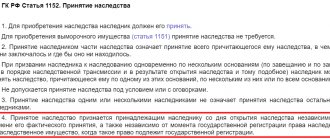If the apartment is privatized for three people, one dies, who is the heir?
And in the case when the spouse of the deceased parent is a stepmother or stepfather, then his part of the living space is transferred to the children, regardless of whether they were relatives of the apartment owner or not.
Grandmother, grandfather, surviving father or mother can write a waiver of the inherited part of the apartment in order to increase the share of the property of the children of the deceased.
If a will of a father or mother has come into force, depriving the children of an inheritance, then they have the right to claim half of the share entitled to them by law in the event of their incapacity due to age (health) or incapacity for work.
Who will get the apartment after the death of her husband? The wife, as the primary heir by law, has the right to claim part of the apartment even if half of the living space is due to her as part of joint property with her late husband. She shares the right of inheritance with her husband's parents and his children.
How is a privatized apartment divided by inheritance and will?
If there is no documentation confirming the relationship, it should be restored through the archives, or the existence of family relationships should be recognized through the courts.
After this, it becomes possible to inherit a share in the apartment. When registering an inheritance after the death of a husband, you should clarify in whose name the residential property was registered.
Residential property acquired during marriage will be joint property.
Attention The successors will inherit only ½ of the housing. A privatized apartment as an inheritance under a will is formalized after the presentation of the will of the deceased. The successors must find and provide the order to the notary themselves. They have the right to request a will from a notary if they know where exactly the order was drawn up.
Who will get the privatized apartment after the death of the owner?
Important Inheritance tax will be calculated based on the estimated value of the BTI apartment. Obtaining ownership rights You will be able to obtain ownership rights only six months after the opening of the inheritance procedure.
- a document confirming the death of the testator;
- a will or document indicating that you are related;
- title document for the apartment;
- a certificate from the place of residence of the testator;
- passport.
After the notary checks all the documents, the inheritance case is opened.
The procedure for inheriting a privatized apartment
How is privatized living space divided:
- Equally between the successors of the current line of succession by law and dependents*.
- In the amount and ratio specified in the will**.
(*) - according to Art. 1148 of the Civil Code, the right to inheritance will belong to dependent relatives up to the 5th (inclusive) degree of kinship, provided that they are supported by the deceased for 1 year or more, or to dependents who are not included in the circle of legal claimants, but who lived with the testator for a year or more.
(**) - the exception is the legal holders of a compulsory share of the inheritance (incapacitated close relatives of the deceased, minor children, dependents), who receive half of the part of the property due to them by law.
Examples The first priority for receiving a privatized apartment after the death of the owner is his relatives, and their circle may be wider than it seems at first glance.
Division of a privatized apartment after the death of the owner
If one of the co-owners dies, what is inherited is not the real share (for example, one room), but the so-called ideal share in the joint property. For example, the deceased was one of three owners of a common privatized apartment.
Besides him, the owners of the apartment were two more brothers. Each of them owned 1/3 of the joint property. The 1/3 belonging to the deceased was divided between three heirs - his wife and two sons.
Thus, there are five owners of the apartment - two brothers of the deceased own 1/3 each, the wife - 1/6, two sons of the deceased - 1/6 each. Division of joint property into shares It often happens that joint ownership and use of common property is inconvenient. Co-owners do not always have a warm relationship with each other.
The nuances of inheriting a privatized apartment
Having figured out how a privatized apartment is inherited after the death of the owner, the successors must decide on further actions. Anyone who has registered a share can sell, donate, or bequeath a part of a privatized apartment.
When selling real estate within 3 years after re-registration of ownership of a privatized apartment, you will have to pay a tax to the state in the amount of 15%. This is stipulated in inheritance legislation. Non-privatized residential property Some Russians live in municipal housing.
Inheritance of a non-privatized apartment is not permitted by law. Relatives who lived together with the deceased Russian have the right to sign a new agreement on renting real estate with the municipality.
Such inheritance of a non-privatized apartment by law, by transferring the rights to become the main tenant, is permissible.
Who will get the privatized apartment after the death of the owner?
After the death of the owner To receive an apartment by inheritance, you must:
- collect documents regarding the death of a relative, and documents that confirm family relationships;
- contact a notary;
- obtain a certificate of inheritance;
- register the received right to inheritance.
After completing the above steps, you will become the legal owner of the apartment. The procedure for registering an apartment as an inheritance To formalize the inheritance procedure, the first step is to declare your rights to the inherited property by submitting an application within six months after the start of the inheritance procedure.
If you don’t know which notary you need to go to, then contact anyone, indicating the details and address of residence of the testator. The notary will tell you which one you need to contact.
Lawyer recommends The described procedure in reality is often complicated by accompanying circumstances, in the light of which it becomes difficult to establish to whom the share of the privatized apartment is transferred and in what amount it is distributed among non-legal recipients.
Therefore, in order not to waste time and ensure compliance with your legal rights, it is important to seek help from a competent specialist, and it is advisable to do this as early as possible. Lawyers of the portal https://ros-nasledstvo.
ru provide their clients with consultations free of charge and in a convenient format - for this it is enough to use an electronic form.
Still have questions? Ask our lawyers right now! Ask a question to an expert lawyer for FREE! Write your question and our lawyer will call you back within 5 minutes and give you a free consultation.
Thus, the primary heirs are the husband or wife, children, and parents. If they agree to inherit, the property of the deceased is divided equally between them.
Other relatives are not called upon to inherit. If there are no primary heirs (or they refused or were excluded from inheritance), the right of inheritance passes to the second priority - brothers and sisters, grandparents.
And so on - until the seventh stage. You can find out a complete list of queues and the order of inheritance by law in the article “Order of inheritance by law.” Heirs under a will If the deceased made a will during his lifetime, the inheritance goes to those persons whom he indicated in this document.
Even if these are strangers, not only individuals, but also legal entities. If the will does not directly indicate relatives (even the closest ones), they are not called upon to inherit.
An alternative option is to enter into an inheritance according to the will left by the owner of the privatized apartment. The heirs of the privatized apartment distribute the share of the deceased. Unless otherwise agreed, the apartment is privatized in equal shares.
If the deceased did not own the whole apartment, but only part of it, then the inheritance of the share in the privatized apartment that belonged to him is transferred.
The remaining two owners of a privatized apartment receive nothing solely on the basis of the joint privatization process. If they are heirs by right, you will have to contact a lawyer as usual.
Inheritance of a privatized apartment after the death of a spouse The spouse is automatically the heir of the first priority. On the basis of which they can claim their right.
And we also have
Source: https://territoria-prava.ru/esli-kvartira-privatizirovana-na-troih-odin-umiraet-kto-naslednik/
Rights of family members when privatizing an apartment in equal shares
It is important in the case when the apartment was privatized for three or more people before the sale, to do everything correctly. After all, this is the only way you will be insured against litigation, which may begin within three months after concluding a transaction with an outside buyer. Carefully documenting each step will help you prove that you have made your terms known to other shareholders.
We recommend reading: Amount of Fine for Running a Red Light
The easiest way if money is needed to purchase the rest of the apartment or share. In this case, the bank will be more willing to issue the required amount, and the package of documents will be minimal. It is much more difficult to obtain funds for other purposes. In this case, you will need to do the following steps:
How a privatized apartment is divided by inheritance and will: share, who has the right
/ Inheritance / How a privatized apartment is divided by inheritance and will
If the privatized apartment belonged to the deceased individual, inheritance occurs according to the general rules. But if the deceased was only one of several owners of this home, only his share is subject to inheritance. In this regard, questions and misunderstandings sometimes arise.
For example, if the privatization agreement indicates 3 owners, one of whom is deceased, only 1/3 of the privatized apartment is subject to inheritance.
In this article we will look at who will inherit a privatized apartment and what is the procedure for dividing it between the heirs.
Who has the right to inherit a privatized apartment
As you know, the law provides for two methods of inheritance:
Depending on whether a will was drawn up, the privatized apartment (or a share of the apartment) will go to the closest relatives of the deceased or other persons to whom the deceased bequeathed his property.
Heirs by law
If the deceased did not have time to make a will, inheritance occurs according to law. The Civil Code establishes that relatives have the right to inherit - in order of priority, depending on the degree of family relations.
So, the primary heirs are the husband or wife, children, parents . If they agree to inherit, the property of the deceased is divided equally between them. Other relatives are not called upon to inherit. If there are no primary heirs (or they refused or were excluded from inheritance), the right of inheritance passes to the second priority - brothers and sisters, grandparents. And so on - until the seventh stage.
You can find out a complete list of queues and the order of inheritance by law in the article “Order of inheritance by law.”
Heirs by will
If the deceased made a will during his lifetime, the inheritance goes to those persons whom he indicated in this document. Even if these are strangers, not only individuals, but also legal ones.
If the will does not directly indicate relatives (even the closest ones), they are not called upon to inherit. The exception is for persons entitled to an obligatory share in the inheritance. They are a disabled husband or wife, parents, minor children - they have the right to half of their legal share, even if they were deprived of any share by a will.
Note!
Even if the deceased is one of the co-owners of the apartment under the privatization agreement, this is not a basis for the inheritance of his share by other co-owners of the privatized apartment. The right of inheritance is exercised by law or by will, and not by privatization agreement.
Example:
So, for example, three brothers can be co-owners of a privatized apartment.
In the event of the death of one of them, 1/3 of the share will be inherited not by the two brothers-co-owners of the apartment (who are representatives of the second line of heirs), but by the primary heirs of the deceased - wife, children, parents.
Only in the absence of representatives of the first stage will representatives of the second stage - brothers - be called upon to inherit. Co-ownership of a privatized apartment does not give the right to inheritance.
Read more about this form of housing ownership in the article “What does a privatized apartment mean?”
Order of succession
The procedure for inheriting a privatized apartment is no different from inheriting any other property and consists of the following stages:
- Contacting a notary at the place where the inheritance was opened.
- Submitting an application for inheritance.
- Preparation of documents. The main documents are the heir's passport, death certificate, documents confirming the right of inheritance (will or family relationship), documents for the apartment (privatization agreement).
- Payment of the state duty, the amount of which is determined depending on the appraised value of the apartment and the family relationship between the deceased owner of the apartment and the heirs (see “State duty for inheriting an apartment”);
- Obtaining a Certificate of Inheritance;
- Registration of property rights in the MFC or Rosreestr.
Term
The inheritance procedure must be carried out no later than six months (6 months) from the date of opening of the inheritance. Even if the six-month deadline was missed, this does not mean that it cannot be restored. You can do this in two ways:
- Judicial - by filing a lawsuit with the court to restore the missed deadline. You can count on a positive decision only if the deadlines were missed for valid reasons, which are documented, for example, illness, business trip, being in a disaster zone.
- Extrajudicial - by agreement with the heirs who entered into the inheritance on time and do not object to the addition of another heir.
Share in an apartment by inheritance after death
For registration of inheritance, it does not matter what kind of ownership the privatized apartment is in - shared or joint. This matters only for the co-owners and heirs of the apartment, who will subsequently decide the issue of division, use, and disposal.
Inheritance of a share in joint property
If during the privatization process the shares of the co-owners were not indicated, then the apartment became their joint property. They are all entitled to equal rights to joint property.
If one of the co-owners dies, what is inherited is not the real share (for example, one room), but the so-called ideal share in the joint property.
For example:
The deceased was one of three owners of a common privatized apartment. Besides him, the owners of the apartment were two more brothers. Each of them owned 1/3 of the joint property.
The 1/3 belonging to the deceased was divided between three heirs - his wife and two sons.
Thus, there are five owners of the apartment - two brothers of the deceased own 1/3 each, the wife - 1/6, two sons of the deceased - 1/6 each.
Division of joint ownership into shares
It often happens that joint ownership and use of common property is inconvenient. Co-owners do not always have a warm relationship with each other.
If one or more co-owners want to dispose of their ideal share (sell, donate, bequeath) - then it is possible to divide the joint property with an exact indication of the share of each owner. And provide each co-owner with the opportunity to dispose of their share.
Co-owners should contact a notary and draw up an agreement on the division of joint property.
Since we are considering a specific situation with an inherited privatized apartment, this may be an agreement on the division of an inherited privatized apartment.
This agreement specifies the size of the share of each owner - the shares may be unequal if the co-owners have reached an agreement on this.
If an agreement cannot be reached, a claim for the division of the inherited apartment must be filed in court. As a rule, the court resolves the controversial issue as follows - divides the common property into equal shares.
Even after dividing the apartment into ideal shares, the allocation of a real share in most cases is very problematic or completely impossible. For example, a one-room apartment is indivisible; it is also impossible to allocate three shares in a 2-room apartment.
To dispose of a shared apartment, co-owners most often resort to:
The last option is the most optimal. If you sell the apartment in shares, the total proceeds will be less than if you sell it entirely. Some shares are not in demand on the market. They are bought at a reduced price.
For example, if an apartment costs 2 million rubles, and one of the shareholders sells ½ share, this does not mean that he will gain 1 million rubles (half). Most likely the amount will be more modest, for example - 700-800 thousand rubles, or even lower (see.
“How to calculate the cost of a share in an apartment”).
What we learned:
- A privatized apartment is in common ownership, less often - in individual ownership.
- Inheritance occurs either by law or by will.
- If there is no will, the first to claim housing are the mother, father, children and spouse of the deceased - the heirs of the first priority. If they are absent, the right goes to the second priority, and so on.
- A will has primacy over the law. If the testator left a will, the apartment will go to those indicated in it. An exception for dependents - they are entitled to a mandatory share in the apartment.
- The heirs are given 6 months to declare their rights.
- Joint ownership of a privatized apartment can be divided into shares - by agreement or as part of legal proceedings. Usually they resort to partition by agreement. For example, purchase and sale or donation of a share. The ideal option is to sell the apartment and divide the money according to shares.
So, dividing a privatized apartment by inheritance is not the easiest task. Usually there are many heirs, but only one place to live. Of course, you will have to take into account the interests of other co-owners of the apartment. Their shares cannot be touched.
Very often during inheritance, disputes arise - who should inherit a larger share, what to do with them, should the obligatory share of dependents be taken into account? Before the situation reaches the boiling point, it is better to contact a lawyer and resolve the issues legally.
Will a lawyer study your situation and tell you what is the best thing to do? The advice will be useful not only to heirs, but also to those who want to sell shares in the market.
Source: https://law-divorce.ru/kak-delitsya-privatizirovannaya-kvartira-po-nasledstvu-i-zaveshhaniyu/
Underwater rocks
Rights to an apartment privatized before 01/31/98 are valid without additional registration on the basis of the provisions of Law No. 218-FZ of 07/13/15, where Article 69 specifies voluntary participation in registration. The spouse living in the apartment at the time of privatization is obliged to participate in it or submit an official refusal, even if he moved into the apartment after drawing up a social tenancy agreement (how to fill out an application for refusal of privatization?).
All family members have the right to receive their share, even if at the time of privatization they lived in another residential area. This includes former spouses who moved out with their young children after a divorce.
PLEASE NOTE: Any violation of the property rights of third parties committed during privatization may lead to its contestability and invalidity.
All controversial issues are resolved by filing a civil claim in the district court at the location of the apartment.
The apartment has been privatized for three people, one is dying, what to do?
And then transfer them to the registration chamber for taking ownership and making the appropriate entries in the state real estate register.
To accept an inheritance, you only need to write an application to the notary at the place of registration of the property. It is important to take into account the requirements of the law to respect the interests of those persons whom the testator cannot legally deprive of property.
Even if there is no mention in the will, part of the property is awarded to the heirs by absolute right.
The apartment is privatized for three…
Hello! Only heirs or persons named in the will can claim this share. It cannot switch automatically. The heirs must contact a notary within 6 months to enter into the inheritance.
After this period, the heirs receive a notarized certificate of the right to inheritance and register ownership in the registration chamber. There may be a whole bunch of heirs for this share (parents, spouse, children, etc.). The only thing you need to prove to the notary is your relationship with the deceased. Good afternoon.
Is it necessary to re-register an apartment if one of the owners has died?
Unless otherwise agreed, the apartment is privatized in equal shares. If the deceased did not own the whole apartment, but only part of it, then the inheritance of the share in the privatized apartment that belonged to him is transferred.
The remaining two owners of a privatized apartment receive nothing solely on the basis of the joint privatization process.
If they are heirs by right, you will have to contact a lawyer as usual.
Inheritance of a privatized apartment after the death of a spouse The spouse is automatically the heir of the first priority. On the basis of which they can claim their right. Moreover, if the deceased spouse took part in the privatization, regardless of whether the property was previously privatized by one of them or jointly.
The apartment was privatized, and one of the family members died...
Gennady Konstantinovich Kruglov This lawyer is from the city of Moscow What of the 7 lines of inheritance is there no one? Article 1151 of the Civil Code of the Russian Federation. inheritance of escheated property 1.
in the event that there are no heirs both by law and by will, or none of the heirs has the right to inherit or all heirs are excluded from inheritance (Article 1117), or none of the heirs accepted the inheritance, or all heirs refused the inheritance and In this case, none of them indicated that they were refusing in favor of another heir (Article 1158), the property of the deceased is considered escheat. 2.
Country of Soviets
Good afternoon, help me understand my question, thanks in advance.
Our apartment is privatized for my grandmother and two grandchildren, 1/3 each, and my mother is also registered in this apartment; she did not participate in the privatization. Grandma died, what to do with her part, the apartment and where and when to go to decorate this part of the apartment.
Grandma has no one but us. What to do if the owner of a privatized apartment dies?
We recommend reading: How many times are you given a deferment from the army for studies 2020
Is your mother your grandmother's daughter or is this grandmother from your father's side? The first priority heirs are the children, parents and spouses of the testator. One of the most common types of inheritance is the inheritance of a share in a privatized apartment. If the testator left a will where the future owner is determined, the situation becomes simpler.
In this case, persons entitled to an obligatory share in the inheritance can challenge the heir's right: minor or disabled children of the testator; parents, if they are pensioners or disabled; former spouse who was dependent on the testator.
How to inherit a privatized apartment without a will
When a privatized apartment belonged only to the deceased, receiving an inheritance follows the general rules. If the deceased was only one of several homeowners, only his or her share may be inherited. Disputes and misunderstandings can often arise about this.
For example, if real estate, according to a drawn-up agreement, was privatized for three people in equal shares, one of whom died, you can only inherit 1/3 of the privatized apartment.
Who will get a share in an apartment privatized for three people after the death of one of the owners?
According to the law, there are two ways to inherit real estate: by will and by law.
The first group does not always include relatives; a will for a share in an apartment can be drawn up by the owner in favor of any person.
Numerous relatives belong to the second group. In this case, the share in the apartment is registered according to the order of priority, which can be learned from the Civil Code of the Russian Federation (Civil Code of the Russian Federation).
Children born after the death of the owner of a share in the apartment, but conceived during his lifetime, are also considered heirs.
How is a privatized apartment divided after the death of the owner?
If, according to the privatization agreement, the owner is not one person, but several, then the heir can take possession of only a share in the privatized housing. The first line of heirs includes:
- the remaining one of the spouses. At the time of the owner's death, their marriage must be formalized. Former spouses and those living in a civil marriage cannot claim a share;
- parents of the deceased. Parents who have been deprived of parental rights to their child cannot claim an inheritance;
- children. This category includes both able-bodied relatives and minors.
Second and third order:
- according to the second stage, the property will be received by brothers and sisters, grandparents;
- the third includes uncles and aunts.
The order of accepting an inheritance may change if representatives of the previous level:
- voluntarily renounced the inheritance;
- recognized for various reasons as unworthy heirs;
- not specified by the deceased in the will;
- did not show interest in receiving the inheritance during the entry period.
If at least one of these reasons exists, the heirs of the previous stage lose the right to accept the property.
The absence of heirs of the first three categories gives the right to inheritance to the following relatives, which include:
- 4th stage: it includes great-grandparents;
- 5th turn: this group of relatives includes great-uncles and grandmothers, grandchildren;
- 6th stage: this group includes cousins and uncles, nephews and great-grandchildren;
- 7th queue: the queue includes the stepmother, stepfather, stepdaughters and stepsons.
In addition to the seven queue points indicated, there is an eighth queue point. It includes heirs who are dependents of the deceased testator.
Any of the heirs, if they deem it necessary, can abandon their share or sell it to other heirs. In case of refusal of an inheritance certified by a notary, it is no longer possible to reverse the process.
Documents required for registration of inheritance
The process of preparing the necessary documents for inheritance can begin six months after the death of the owner of the share in the apartment. The list of documents is as follows:
- death certificate - the main document received at the registry office;
- certificate of residence;
- application for accession to inheritance rights;
- documents to confirm relationship;
- ownership documents;
- property valuation document, BTI certificate;
- extract from the personal account;
- house book (extract from it);
- certificate from the housing department.
You will have to resort to drawing up documents in court if the heir could not or did not want to take over the rights of inheritance within the allotted period. The shares of the inherited property will be determined by a court decision.
What happens if a privatized apartment is located in a building for demolition?
In return, the house, which will soon be demolished, is provided with living space according to the standards for one person. One person is entitled to 18 sq. m of living space.
If a family of three lives in a room with an area of 45 square meters. m, in return they will receive a property with an area of 54 sq. m. m. In this case, it will be considered that the residents were provided with equivalent housing.
Many people are interested in the question: should new housing be equal to the square footage of the former housing or the number of rooms? In this case, the number of rooms does not play any role; the living space is distributed by square meters.
If the owner lives in a “Khrushchev” building with an area of 45 square meters. m, then in a new house such footage is typical only for a one-room apartment, which he will receive. In case of disagreement, you can contact the BTI with additional payment of the amount provided by law.
Who has the right to receive a share in the inheritance?
The property belonging to the deceased goes to the heirs in equal parts. The division of material wealth, which is considered common shared property, can be completed no later than three years from the date when the inheritance was opened.
When inheriting real estate, such actions can be performed only after a certificate of inheritance has been received.
If the privatized apartment is not subject to division in natural size, the advantage of inheriting the share is received by:
- citizens and co-owners of the deceased, regardless of legal successors, who lived in the same apartment with the testator, who constantly used it, but are not the owners of this real estate;
- legal successors, despite the lack of a common right to housing with the deceased, but periodically using it until the day of his death. One condition is important: there must be legal grounds for using the premises;
- persons who permanently lived with the deceased owner of the share until the day of his death. There is also a caveat here: citizens should neither own nor rent other living space under a contract.
The legal successor who acquired housing on this basis is obliged to pay compensation to the remaining heirs for part of their property.
Source: https://privatizacia.info/kvartira-privatizirovana-na-troih-v-ravnyh-dolyah-odin-umiraet/
Specifics of the privatization program regarding a room in an apartment
This type of privatization has the following features:
- The entire apartment is subject to privatization; parts of the apartment cannot be privatized separately.
- When it comes to the privatization of a room, in contrast to the privatization of a share of an apartment, in addition to the share of the apartment, the rights to a certain room in it are also transferred into ownership.
- During the privatization of a room allocated in kind in an apartment or house, the consent of other residents is not required, unlike shared privatization.
- After the registration of ownership rights to a share in the apartment is completed, the document must indicate the size of the share and the right to its ownership in the apartment.
Relevance of the article: 06/16/2013 11:41:43
<< go backList of all articles >>
Tell your friends about this article!
Privatized apartment after the death of one of the owners: who inherits the share of the deceased?
When a close relative dies, in whose name a share in a privatized apartment is registered, potential heirs living with him expect to become the owners of this living space. Since the inherited housing is owned by several persons, the procedure for re-registration of the share has its own characteristics.
How is a share in a privatized apartment inherited?
The process of inheriting privatized real estate is regulated by civil law and has certain nuances. According to the law, persons permanently residing in residential premises on the basis of a social tenancy agreement can become participants in privatization. After the death of one of the owners, legal successors can claim his part of the privatized square meters.
If the owner of the apartment disposed of his property during his lifetime and left a will, the registration of a share in the property will be carried out by the persons indicated in the last will of the deceased. In the absence of a testamentary disposition, the residential premises or part thereof that belonged to the testator are inherited by law in order of priority.
According to the will of the share owner
When drawing up a will, the owner of a share in a privatized property can choose any individual or legal entity as a legal successor. The presence of kinship is not a prerequisite for drawing up a document.
Close relatives not mentioned in the testator's order cannot claim the privatized living space.
The exceptions are children under 18 years of age (including those born after the death of the testator), dependents and disabled persons who belong to the first stage of kinship inheritance established by law.
They have the right to demand half of the share due to them by law and to defend their interests in court.
According to the law according to the order
If one of the property owners did not have time to document the disposal of his acquired property during his lifetime, after his death the ownership right passes to the legal successors (more details in the article: who will get the apartment after the death of the owner if there is no will?). The current legislation determines the order in which potential heirs assume their rights. This principle is based on the degree of relationship of the deceased relative with the legal successors.
INTERESTING: who inherits without a will after the death of her husband?
The Civil Code of the Russian Federation recognizes such close relatives as natural and adopted children, legal spouses and parents of a deceased person as priority heirs. The testator's property is distributed between them in equal parts. The rest of the relatives do not participate in the inheritance.
The right of inheritance passes to the second-priority successors (grandfathers, grandmothers, sisters, brothers) in the absence of primary heirs, an officially formalized refusal or exclusion from entering into the inheritance. According to the same principle, inheritance rights are transferred to the next successors.
The law establishes seven degrees of kinship, representatives of which can claim the property of a deceased relative in order of priority. The eighth line of inheritance allows his disabled dependents to receive the property of a deceased person who has no relatives (we recommend reading: dependents: who are they according to the law of the Russian Federation).
How to register an inherited share?
The process of registering an inherited share in a privatized apartment can begin after the inheritance has been opened (we recommend reading: the right to allocate a spousal share in the inheritance by law after the death of a spouse). It consists of several stages:
- studying the rights to assets owned by the testator;
- filing an application for inheritance rights;
- payment of the state fee for registration of documentation;
- state re-registration of housing rights.
In order to avoid problems when registering ownership of a share of a residential premises, it is necessary to consult with a notary about the intricacies of this procedure.
If not one successor, but, for example, three, has the right to inheritance, it will be necessary to draw up an agreement on dividing the inherited share into three parts.
Disputes between successors, the subject of which is inherited property, are resolved in court.
Where to apply and when?
The legal successors of the property owner must apply for acceptance of the inheritance to the notary's office no later than 6 months from the date of death of the testator. If you apply at a later date, the legal heir will have to defend his rights in court.
The closure of the inheritance case is carried out by a notary six months after its opening. Legal successors who express a desire to inherit within a six-month period are issued certificates of the right to inherit the corresponding shares.
To re-register the received share in a privatized apartment, the new owner must contact Rosreestr at the place of registration of the residential premises with a corresponding application. The registration procedure takes seven working days, after which the owner is issued a new owner certificate.
What documents are needed?
When contacting a notary office, the legal successor must submit to the specialist a corresponding application and the following list of papers:
- death certificate of the owner of a share in a privatized residential premises;
- a testamentary disposition or document confirming the presence of family ties with the deceased;
- a certificate containing information about the place of permanent registration of the testator;
- internal passport of a citizen of the Russian Federation;
- title documentation for housing;
- a report from an appraisal company or other paper with information about the current value of the premises.
To re-register ownership rights to an inherited part of privatized housing, you must fill out an application form and submit it to the Rosreestr branch or the nearest MFC. Along with the application you will need to provide:
- certificate of inheritance issued by a notary;
- documentation for the property;
- a receipt confirming payment of the state fee for registering rights to an apartment in the amount of 2,000 rubles.
Is it possible to actually accept an inheritance without going to a notary?
If a citizen accepted an inheritance, but did not formalize it accordingly within six months, he can count on receiving a certificate of heir in the future. To do this, he must provide the specialist with undeniable evidence of the fact of acceptance of the testator’s property.
If the notary has not confirmed the actual acceptance of the inherited assets, the heir may go to court to obtain the possibility of legal registration of the accepted share. Acceptance of property must be accompanied by the adoption of measures to preserve it, manage it, and bear the costs of maintaining the apartment on the part of the heirs.
Source: https://SemPravorf.ru/nasledstvo/privatizirovannaya-kvartira-posle-smerti-odnogo-iz-vladelcev.html
Owners of privatized housing
The issue of privatization and resolving issues of determining the owner is quite popular today. The process is the same for everyone in terms of rights and opportunities. This service is free for one-time use. But controversial issues may arise regarding the determination of who will be the owner. Privatization concerns only the property that was transferred under a social contract. hiring
Who is the owner of the privatized apartment and who is its heir?
As you know, after receiving rights to property, it will be equally divided among the whole family, and then the opportunity to carry out any transactions with it is given: donation, sale, inheritance.
The apartment is privatized for two
An apartment is classified as indivisible property, therefore, if the property is transferred to more than one citizen, it will be shared ownership.
Each of those registered is assigned a certain part of the required square meters. During the re-registration procedure, each of the owners is provided with equal parts of the housing.
This means that each of the people who participate in obtaining the property is given the status of co-owner on equal rights.
When privatizing property for two people, they are given half of the square meters. But, if the parents privatized the apartment for themselves, then their property in the future will be divided in equal proportions into three parts. But the registration of two people does not mean that there are only two owners.
If a person has a registration at a specific address in his passport, this does not mean that he can fully dispose of an apartment or house. In addition, the person living in the apartment decides for himself whether he needs further registration. The owner is given the opportunity to provide registration to any citizen, both relatives and friends.
If a person is a co-owner of real estate, he is given the opportunity to freely dispose of his share in the property (selling part of the property, bequeathing it, drawing up a deed of gift, etc.).
Human rights should not be violated during acquisition of housing ownership. But in this case, a person has several options for developing actions:
- an agreement with the second resident of the apartment or house for the sale of half of the apartment and the sale of the property in full (the funds received after the outcome of the agreement are transferred between the selling parties in the corresponding parts of square meters);
- finding a buyer (third party) and notifying the co-owner of the property regarding the sale of a part in the apartment (it is mandatory to notify the owner of this, since he has pre-emptive rights to buy the property).
In the case of the last point, there should be a focus on the actions of the co-owner of the residential property. The notification is issued in writing and sent to the owner of part of the square meters by postal order (the paper with the notification is given in person).
There is also the issue of inheritance to consider. For example, if an apartment is privatized for a mother and daughter, as well as for a father, then the property is transferred to the child by inheritance.
The apartment is privatized for three
If property rights are transferred privately, responsibility for housing increases or is divided in half. But you need to take into account a nuance: utility bills will increase.
But privatization also has positive sides. Registration of real estate for several people at the same time may have its own nuances. The property is used under a social rental agreement.
Square meters for living should not be in disrepair. There are no restrictions in this case on the number of registered citizens. The number of people who have a residence permit is the number of housing privatizations that will be required. If there are minors, they must be taken into account in this procedure so that rights are not disputed.
After privatization, the apartment can be used for three or more people. But this is not a mandatory event, since it can be waived. In this case, the share of the property will be determined in equal proportion to the registered people who agree to privatization. Although a person will not have full ownership of the property, he can live in it throughout his life.
If you want to allocate the legal portion to one of the family members, you need to contact a notary office to certify this procedure. But there will not be equal shares in the property under such circumstances. Living on square meters that do not belong by right of ownership is permitted to a person in accordance with civil law.
Accommodation is possible with family.
For example, if the privatization procedure was completed in equal parts for three people, but then one of them enters into a legal relationship, he can divide his part with his wife.
In the case of minor children, everything is simpler: they automatically receive part of the real estate. After reaching 18 years of age, this guarantees the possibility of registering privatization again.
If the apartment is not privatized, who is the owner of the apartment?
If the residential property has not been privatized, then the owner is:
- municipal body;
- government structure;
- factory or other corporation.
But those who live in the house cannot be considered direct owners, which gives the right to coordinate their decisions when making changes or alienating property. In most cases, these objects are obtained after receiving a social or other agreement.
Conclusion
Privatization is not a compulsory measure, so the decision is made by the individual. Designation of ownership may be required when resolving controversial issues.
If the owners do not agree on their shares and their boundaries, they can go to court to resolve the issue.
It must be taken into account that when obtaining housing rights, a person, on behalf of all those registered, is engaged in obtaining rights from the municipality. The rest only sign an agreement or refusal.
Lawyer. Education: Federal State Budgetary Educational Institution of Higher Education Udmurt State University, specialty “jurisprudence”, civil law specialization. Since 2020, lawyer on civil law issues (consulting citizens, conducting cases in courts of general jurisdiction and arbitration courts).
Source: https://yurid-sovet.ru/nedvizhimost/sobstvenniki-privatizirovannogo-zhilya.html








